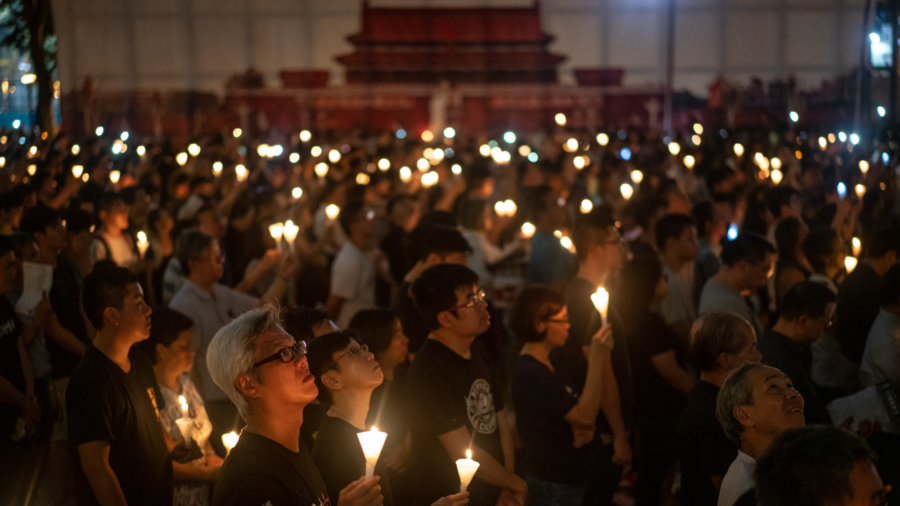For the first time in 30 years, Hong Kong police have banned an annual vigil to commemorate victims of the 1989 Tiananmen Square Massacre.
The decision comes amid growing concerns over Beijing’s tightening control over the city after its rubber-stamp legislature approved a national security law to be implemented in Hong Kong.
Hong Kong Alliance in Support of Patriotic Democratic Movements in China, a pro-democracy organization established in May 1989 in solidarity with Chinese student protesters at Tiananmen Square, has held the candlelight vigil in Victoria Park every year since 1990.
The 1989 protests, which the Chinese regime brutally suppressed in June that year, are a taboo subject in mainland China; the annual vigil in Hong Kong remains the only public commemoration event on Chinese-ruled territory.
Last year, the Alliance said over 180,000 people attended the vigil. Police gave a far lesser estimate of 37,000.
On June 1 afternoon, the Alliance published on its Facebook page the police’s rejection notice. The group had applied for permission to hold activities from 9 a.m. to 10 p.m. local time on June 4.
The police’s reason for rejecting the event was because it could “increase participants’ chances of contracting the virus” and “threaten citizens’ lives and health.”
To prevent the spread of the Chinese Communist Party (CCP) virus, commonly known as the novel coronavirus, the Hong Kong government has placed a ban on group gatherings of more than eight people. The police said the event would violate the ban.
In response to the police decision, the Alliance chairman and deputy chairman, Lee Cheuk-yan and Albert Ho, both former Hong Kong lawmakers, held a press conference in Victoria Park on late Monday afternoon.
Lee said the police ban was “unreasonable and unscientific” since “everything is normal” in Hong Kong, and said the police were using the social distancing ban to suppress their annual rally.
From mid-March to mid-April, Hong Kong saw a huge spike in confirmed cases, from less than 200 cases to surpassing 1,000 cases on April 11. Since then, the infection rate has leveled off in the city. As of June 1, there are 1,088 confirmed cases, among them, 1,037 have been released from hospitals and four have died.
Lee called on the public to participate in its online vigil or commemorate in their own ways. He added that members of the Alliance will still travel to Victoria Park on June 4 evening, in groups of less than eight people each while maintaining proper social distancing, to light candles and observe a minute of silence at 8:09 p.m. local time that day.

Lee also expressed worries about whether the Alliance would still hold the vigil next year, with a soon-to-be implemented national security law in Hong Kong. The law was approved by China’s rubber-stamp legislature last week.
Much of the bill’s specifics will be rolled out in the coming months. Currently, the draft resolution says it will target any activities the Chinese regime deems as “secession, subversion, infiltration, or sabotage.” It would also enable central authorities to send security agencies to Hong Kong.
China’s public security minister Zhao Kezhi said at a political meeting in Beijing last week that to implement the law, the ministry would “provide comprehensive guidance” to Hong Kong police on how to “stop riots”—using a term the Chinese regime has used to describe Hong Kong protesters.
Lee said the annual vigil would be a litmus test to see whether Hong Kong could still enjoy its autonomy and freedoms, as one of the Alliance’s demands is ending one-party rule in China.
Under the proposed national security law, criticism against the CCP could be considered a “subversion” or “secession” offense, according to local pro-democracy lawmakers.
On Sunday morning, the Alliance put up ten questions on its Facebook page, questioning the ambiguous language in Beijing’s draft of the national security law.
The Alliance questioned if the group would be banned under the new law. In another question, it asked whether trials would be held in Hong Kong or mainland China for legal cases charged under the national security law.
The Hong Kong edition of The Epoch Times contributed to this report.
From The Epoch Times

